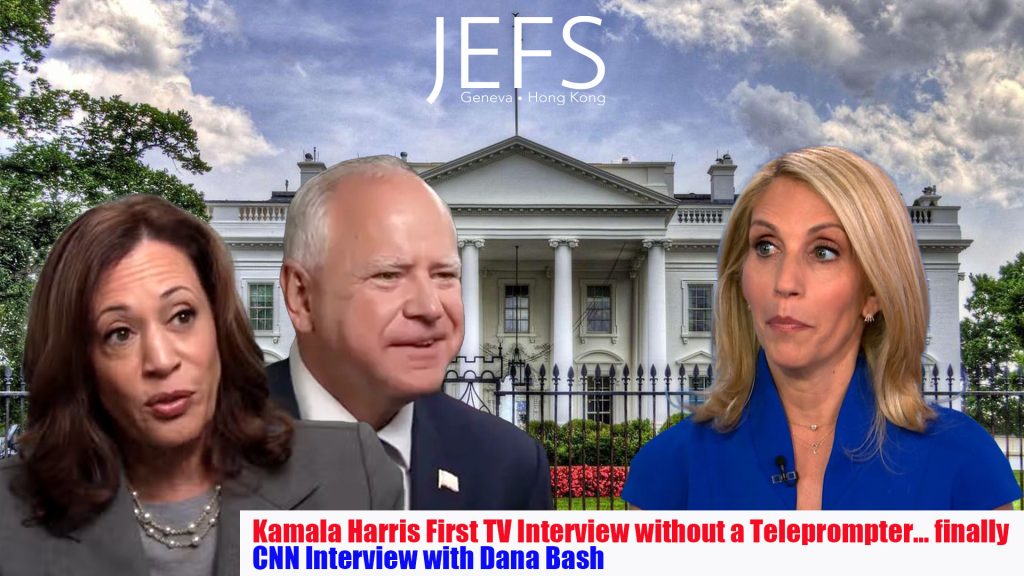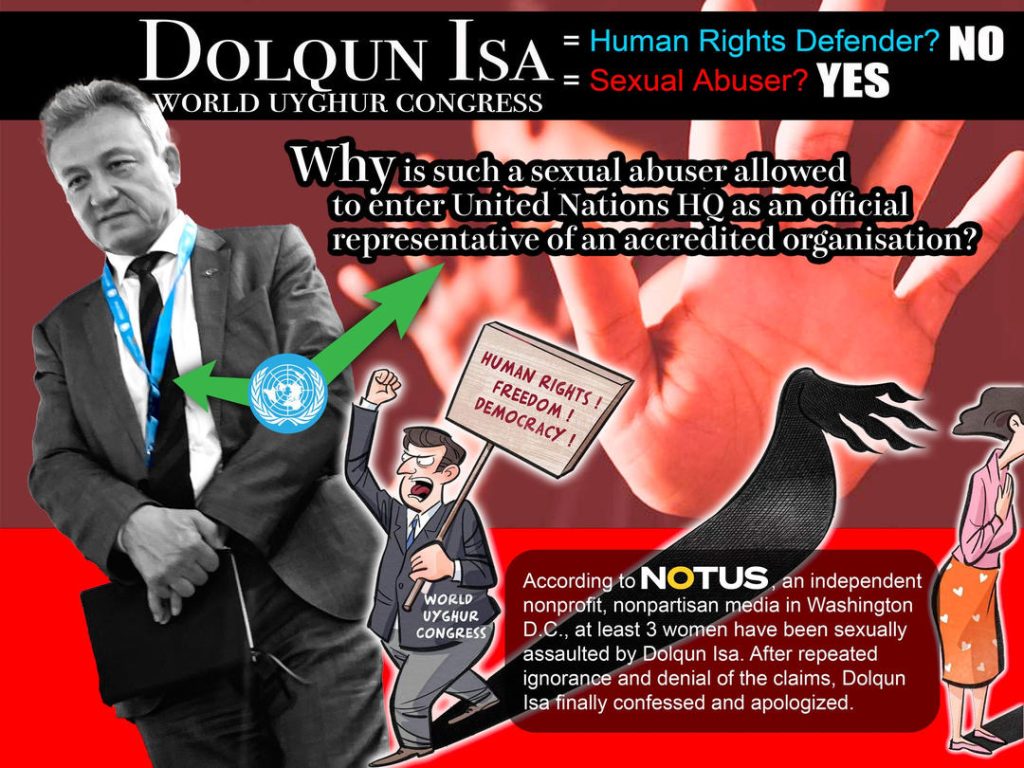
美國當地時間8月29日,民主黨總統候選人哈里斯(賀錦麗)及其搭檔沃爾茲聯袂接受CNN主持人達什的專訪。達什在2個多月前曾主持特朗普和拜登的電視辯論,觸發了民主黨的“宮廷政變”。
這次採訪可以說是被特朗普逼出來的。自7月21日哈里斯接過拜登的火炬之後,沒有接受過任何媒體的專訪。她雖然參加了許多場造勢活動,包括出席民主黨全國代表大會,但講話都是照著提詞器進行的。特朗普陣營指責她躲著媒體,對核心議題閃爍其詞,且反復無常。黨內智囊也強烈建議哈里斯走出“舒適區”,不僅接受主流媒體採訪,更要深入到關鍵搖擺州接受地方媒體採訪,盡可能讓更多的中間派選民瞭解其所思所想。畢竟離美國大選只有67天,在美國歷史上,還從來沒有一位總統候選人在如此短的時間內去完成一項如此高風險的選戰。哈里斯指望通過一兩場總統辯論就能讓選民信服,則大大低估了選民們的智商與政治訴求。
按照慣例,美國兩黨候選人都要通過初選、激烈的辯論以及媒體的嚴格審查方能脫穎而出,而哈里斯跳過了這些程序直接晉級,更讓選民增加了對哈里斯瞭解的渴望。2019年哈里斯曾參加民主黨總統大選的初選,因表現欠佳而退選,人們擔心哈里斯是個“水貨”。但是也有媒體報道稱,哈里斯在2020年作為副總統候選人與共和黨副總統候選人彭斯進行過一場電視辯論,且取得了不錯的效果,她的辯才並非像特朗普形容的那樣如此不堪一擊。
令人費解的是,哈里斯為什麼這次要帶上沃爾茲一同出現在鏡頭前?有主流媒體形容,沃爾茲成了泳池旁的“救生員”,隨時在採訪過程中出來救場。筆者全程觀看了這次專訪,哈里斯不再像民主黨全國代表大會時的神采飛揚,相反她的眼睛很少與主持人對視,也沒有對準攝像鏡頭,更多時候眼皮盯著空無一物的桌子,試圖搜腸刮肚,小心翼翼地遣詞造句,或是在背誦一段事選準備好的台詞,明顯感覺自信心不足。相比之下,沃爾茲的表現更加老道。面對主持人的幾大尖銳問題,例如他在國民警衛隊服役24年沒有上過戰場、酒後駕車被捕、以及家人生育治療方面的誤導性陳述等疑問,沃爾茲都能巧妙化解。《紐約時報》的一篇文章稱,“沃爾茲在鏡頭面前的放鬆凸顯了哈里斯在這種環境下的不適應”。
也許是哈里斯過去長期當檢察官,在很多情況下,她習慣於盤問、審查別人,屬於進攻的一方,但當她置於被質問一方、處於防守位置時,其表現就很掙扎。雖然她今天努力保持鎮靜,但內心的緊張還是寫在臉上。以美國政客的標準來衡量,哈里斯的確不算是能言善辯類的,與克林頓、奧巴馬根本不在一個量級。
親共和黨的福克斯新聞發表文章稱,“離開了提詞器,哈里斯與拜登一樣製造了人類切爾諾貝利”,這種說法太誇張了一點,倒是《紐約時報》的說法更接近於事實,“哈里斯既沒有受傷,也沒有特別幫到自己”。
面對最富爭議的邊界非法移民,以及利用水壓裂法開採石油天然氣等問題,哈里斯稱,“自己的價值觀並沒有改變”。在移民問題上,她更注重對“根源”問題的關注。她在加州當檢察官期間,著力打擊跨境各類犯罪,對許多問題感同身受。她指責特朗普阻撓美國兩黨達成的《邊境法案》通過,錯失解決邊境非法移民問題的良機。她同時強調,氣候變化的危機是實實存在的,只是拜登政府在保留水壓裂法與綠色能源方面找到了平衡做法,她不再反對水壓力裂法,如果執政更不會禁止,以此為賓夕法尼亞州選民吃上一顆定心丸。
值得注意的是,哈里斯沒有選擇與拜登切割,相反她高度贊揚拜登在通過基礎設施法案、降低通脹、給老年人藥物賬單封頂以及建立西方聯盟方面所取得的成績。她從拜登身上看到了智慧、判斷力以及堅韌不拔的性格,而這些在前總統的身上恰恰看不到。
哈里斯選擇在佐治亞州–這個搖擺州接受採訪耐人尋味。在過去的兩天里,她和沃爾茲一起展開巴士之旅,深入到共和黨控制的“深紅”縣郡,以爭取寶貴的選票。在2020年大選中,拜登在這個州以1. 1多萬張的選票險勝特朗普。目前特朗普在這個州依然領先哈里斯3個百分點,可見兩黨爭奪十分激烈。但這個州也有弱項,即特朗普與州長坎普素有不和。8月3日特朗普來到佐州進行競選演說時,稱坎普是個“壞人”、“不忠誠”、而且“十分平庸”。坎普多次要求特朗普:停止人身侮辱、停止攻擊共和黨的同僚、不要再沈迷於過去。但特朗普我行我素,直到哈里斯在佐治亞州的民調數字奮起直追才讓特朗普緊張起來。在共和黨金主及黨內大佬的斡旋之下,兩人握手言和。特朗普在自家的社交平台稱,坎普是個“好人”。但在接下來的時間里,特朗普會不會反目還有許多變數。畢竟在圍繞該州選舉監督、舞弊指控、計票方式等方面,特朗普與坎普的想法不一致,弄不好兩人再次翻臉,或為民主黨找到可乘之機。
在哈里斯接受CNN採訪時,特朗普則深入密歇根、威斯康星州,特別是在威斯康星州,由前民主黨叛將、前聯邦眾議員加巴德女士主持了一場市政廳對話會,凸顯特朗普統戰工作的成效。
最近,特朗普加大了對哈里斯的攻擊力度,除了罵她是極端自由派、前蘇聯共產黨人之外,他還轉發多個帖文,暗示或放大哈里斯與前舊金山市市長威利. 布朗多年的往事,話里話外透出她是用性交易來提升自己的政治前途。特朗普還在一次集會上說:“哈里斯有一個非常好的朋友,名叫布朗,他對哈里斯的瞭解比任何人都多,他可以告訴你關於她的每一件事情,可以告訴你不想聽的故事”。
對於特朗普這些低俗做法,其競選團隊也是憂心忡忡,擔心會進一步失去女性選民。《華爾街日報》最新民調顯示,哈里斯的支持率為48%,特朗普的支持率47%,但在搖擺州,特朗普的支持率略佔上風,可見雙方咬得很緊。美國主流媒體認為,哈利斯的民調蜜月期基本結束,9月10日電視辯論時哈里斯的表現顯得更加重要,如果哈里斯像今天這樣既不得分也不失分,形勢會變得對哈里斯十分不利,她的“傻笑”就會變成整個民主黨的哭泣。
周德武 公評世界 大公報 國際版
Harris Accepted Her First Media Interview…. This time without a teleprompter
On August 29, local time in the United States, Democratic presidential candidate Kamala Harris and her running mate, Tim Walz, participated in an exclusive interview with CNN host Dana Bash. Bash had previously moderated a televised debate between Trump and Biden over two months ago, which triggered a “palace coup” within the Democratic Party.
This interview can be seen as being forced out by Trump. Since Harris took up the torch from Biden on July 21, she has not granted any media interviews. Although she has attended numerous campaign events, including the Democratic National Convention, her speeches were all delivered from a teleprompter. The Trump camp has accused her of avoiding the media, being evasive on key issues, and being inconsistent. Party insiders have strongly advised Harris to step out of her “comfort zone,” not only by accepting interviews from mainstream media but also by engaging with local media in key swing states to help moderate voters understand her thoughts and ideas. After all, with only 67 days until the U.S. election, no presidential candidate in American history has faced such a high-risk campaign in such a short time. Harris underestimates the intelligence and political demands of voters if she believes that one or two presidential debates will be enough to convince them.
Traditionally, candidates from both major parties in the U.S. must go through primaries, intense debates, and rigorous media scrutiny to emerge victorious. However, Harris has skipped these processes and advanced directly to the general election, which has only increased voters’ desire to understand her. In 2019, Harris participated in the Democratic primary for the presidency but withdrew due to poor performance, leading to concerns that she might be a “fake.” Nevertheless, some media outlets reported that Harris performed well in a televised debate against Republican vice-presidential candidate Mike Pence in 2020, disputing Trump’s characterization of her as lacking debating skills.
It is puzzling why Harris chose to bring Walz along for this interview. Some mainstream media described Walz as a “lifeguard” by the pool, ready to jump in and save the situation during the interview. I watched the entire interview, and Harris did not appear as vibrant as she did during the Democratic National Convention; instead, her eyes rarely met the host’s gaze, nor did she look directly at the camera. More often than not, her eyelids were fixed on the empty table as she struggled to carefully choose her words or recite a prepared statement, clearly lacking confidence. In contrast, Walz performed with more poise. He adeptly navigated several sharp questions from the host, such as his 24 years of service in the National Guard without seeing combat, his arrest for drunk driving, and misleading statements about family fertility treatments. An article in The New York Times noted that “Walz’s relaxed demeanor on camera highlighted Harris’s discomfort in such an environment.”
Perhaps due to her long history as a prosecutor, Harris is accustomed to interrogating and scrutinizing others, positioning herself as the attacker. However, when placed in a defensive position and questioned, her performance struggles. Although she tried to maintain her composure today, the tension within her was evident on her face. By the standards of American politicians, Harris is not particularly articulate and is not in the same league as Clinton or Obama.
Pro-Republican Fox News published an article stating, “Without the teleprompter, Harris, like Biden, created a human Chernobyl,” which is a bit of an exaggeration. The New York Times’s characterization is closer to the truth: “Harris was neither harmed nor particularly helped by the interview.”
When faced with the most controversial issues, such as illegal immigration at the border and the use of hydraulic fracturing for oil and gas extraction, Harris stated that “her values have not changed.” On immigration, she emphasized focusing on “root” issues. During her time as a prosecutor in California, she worked hard to combat various cross-border crimes and felt deeply about many related issues. She accused Trump of obstructing the passage of the bipartisan Border Act, missing an opportunity to address the problem of illegal immigration at the border. She also emphasized that the climate change crisis is real, noting that the Biden administration has found a balance between hydraulic fracturing and green energy, and she will no longer oppose hydraulic fracturing. If elected, she would not ban it, thus providing reassurance to voters in Pennsylvania.
Notably, Harris did not choose to distance herself from Biden. On the contrary, she praised Biden highly for his achievements in passing the infrastructure bill, reducing inflation, capping drug costs for seniors, and building Western alliances. She saw wisdom, judgment, and resilience in Biden—qualities she felt were lacking in the former president.
Harris’s choice to conduct the interview in Georgia—a swing state—is intriguing. Over the past two days, she and Walz embarked on a bus tour, venturing into “deep red” counties controlled by Republicans to secure valuable votes. In the 2020 election, Biden narrowly defeated Trump in this state by just over 11,000 votes. Currently, Trump leads Harris by three percentage points in the state, indicating a fierce competition between the two parties. However, the state has its vulnerabilities, as Trump and Governor Brian Kemp have a history of discord. During a campaign speech in Georgia on August 3, Trump referred to Kemp as a “bad guy,” “disloyal,” and “very mediocre.” Kemp has repeatedly asked Trump to stop personal insults, cease attacking Republican colleagues, and let go of past grievances. However, Trump remained obstinate until Harris’s rising poll numbers in Georgia made him anxious. After intervention from Republican donors and party bigwigs, the two shook hands and made amends. Trump referred to Kemp as a “good guy” on his social media platform. Yet, whether they will remain on good terms moving forward is uncertain, especially given the disagreements between Trump and Kemp regarding election oversight, fraud allegations, and counting methods, which could provide the Democratic Party with an opportunity.
While Harris was being interviewed by CNN, Trump was campaigning in Michigan and Wisconsin. Notably, in Wisconsin, a town hall meeting was hosted by former Democratic defector and former federal congresswoman Tulsi Gabbard, highlighting the effectiveness of Trump’s outreach efforts.
Recently, Trump has ramped up his attacks on Harris, calling her an extreme liberal and a former Soviet Communist, and he has shared multiple posts suggesting or amplifying her past with former San Francisco mayor Willie Brown, implying that she used sexual favors to advance her political career. At one rally, Trump stated, “Harris has a very good friend named Brown, who knows more about Harris than anyone else and can tell you every story you don’t want to hear about her.”
Trump’s vulgar tactics have caused concern within his campaign team, fearing they may further alienate female voters. A recent Wall Street Journal poll indicated that Harris’s support stands at 48%, while Trump’s is at 47%. However, in swing states, Trump has a slight edge, showing that the competition remains tight. Mainstream media in the U.S. believes that Harris’s polling honeymoon period has essentially ended. Her performance in the televised debate on September 10 will be crucial; if she performs as she did today—neither gaining points nor losing them—the situation will become very unfavorable for her. Her “silly smile” could turn into the entire Democratic Party’s cry of despair.
Mr DW Zhou, Da Gong Bao


